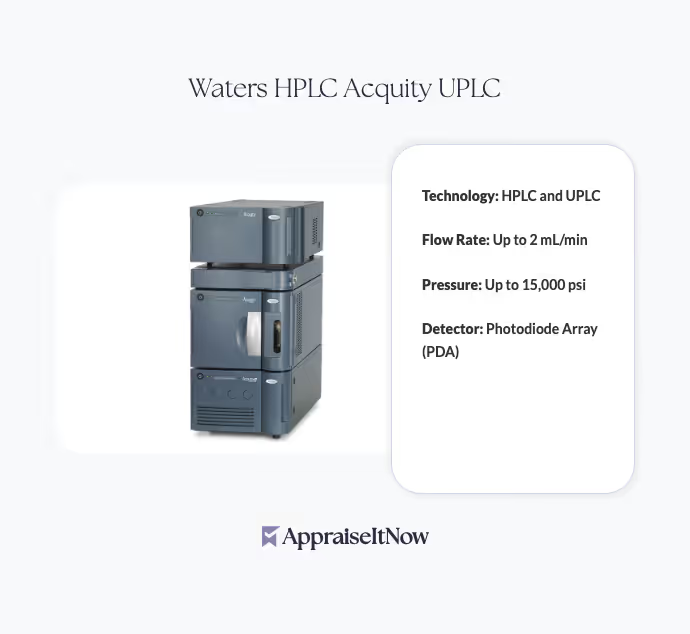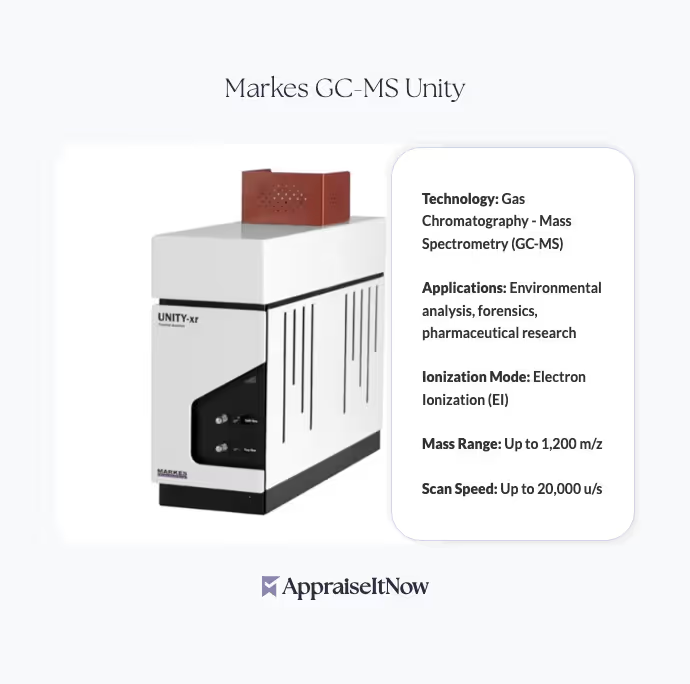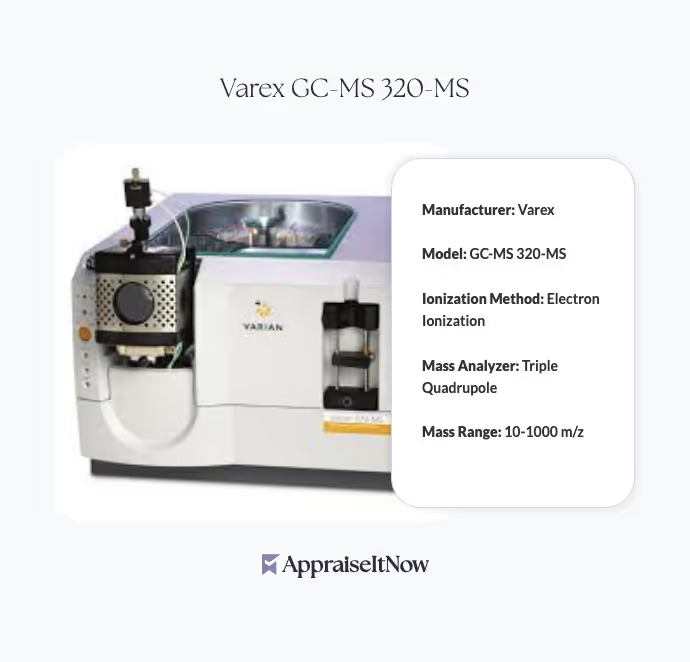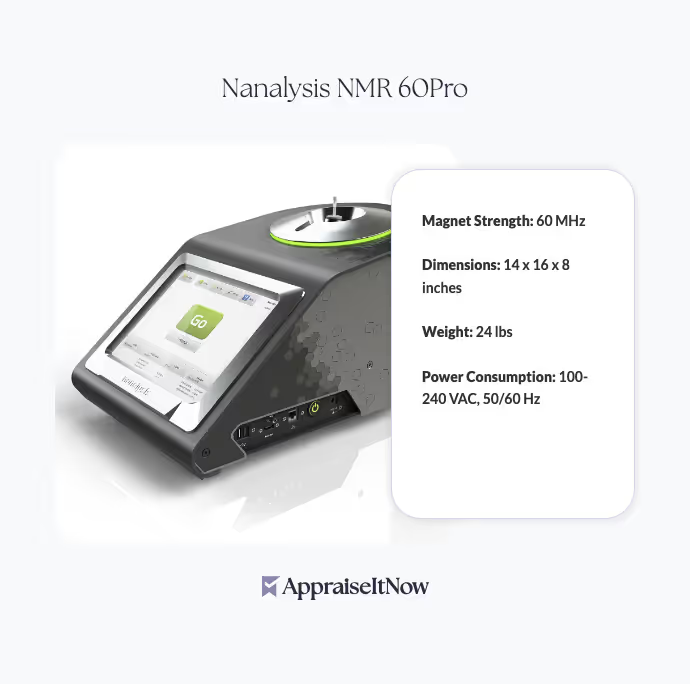<h1>How to Get Your Waters HPLC Acquity UPLC Appraised</h1>
<p>The Waters HPLC Acquity UPLC is a sophisticated analytical instrument commanding significant value in today's laboratory equipment market. If you're considering selling, insuring, or evaluating this advanced system, understanding its current market position—typically <strong>$80,000 to $100,000</strong> for quality used units—helps you navigate the appraisal process with confidence.</p>
<h2>Understanding Your Waters Acquity UPLC's Market Value</h2>
<p>The Waters Acquity UPLC represents a revolutionary shift in analytical chemistry since its introduction in 2004. This system combines high-performance liquid chromatography (HPLC) capabilities with ultra-performance liquid chromatography (UPLC) technology, delivering unparalleled separation speed and analytical resolution. When appraising this equipment, certified experts examine not just the instrument's physical condition but its technological positioning within the competitive laboratory marketplace.</p>
<p>What makes the Waters Acquity different? The system's reputation for exceptional reliability and sensitivity has made it the trusted choice at leading research institutions worldwide. Its ability to streamline complex sample analysis while maintaining precision positions it as a valuable asset for pharmaceutical research, analytical chemistry labs, and quality control operations. Understanding these market dynamics ensures your appraisal reflects the equipment's true analytical and financial worth.</p>
<div class="callout tip"><p><strong>Market Insight</strong></p>
<p>Waters instruments typically retain 60-75% of their original purchase value when well-maintained, making professional documentation essential for insurance and resale purposes.</p></div>
<h2>Key Specifications That Impact Appraisal Value</h2>
<p>Your Acquity UPLC's valuation depends on several technical and operational factors. The revolutionary UPLC technology delivers fast, high-resolution separations—a capability that continues commanding premium pricing in the <a href="/types/lab-equipment">laboratory equipment</a> market. However, specific configurations, upgrade history, and component condition significantly affect final appraisal values.</p>
<p>Systems with complete detector suites, including photodiode array (PDA) and evaporative light scattering detection (ELSD) options, typically command 15-20% premiums over basic configurations. The presence of autosampler upgrades, column heaters, and integrated mass spectrometry compatibility can add substantial value. Similarly, units with documented maintenance records and minimal operational hours typically appraise higher than comparable systems with unknown service histories.</p>
<p>The question of whether UPLC proves more expensive than traditional HPLC reflects in market valuations—specialized UPLC systems like your Acquity consistently appraise at higher price points due to their advanced capabilities and ongoing demand for high-throughput analytical work in pharmaceutical quality assurance and research applications.</p>
<h2>Condition Assessment and Operational Status</h2>
<p>Professional appraisers evaluate your Waters Acquity UPLC across multiple condition metrics. Beyond cosmetic wear, critical assessment includes pump performance, detector functionality, software licensing status, and column availability. The difference between UPLC and UHPLC systems affects valuation—while both represent advanced technologies, your Acquity's established market position and widespread institutional adoption typically support stronger resale values than newer or less-recognized systems.</p>
<p>Systems in excellent working condition with recent calibration certificates and documented system suitability tests appraise significantly higher than units requiring repairs or recalibration. Original software licenses, when transferable, add substantial value—unlicensed systems may appraise 30-40% lower due to the significant cost of obtaining current software packages. Documentation of regular preventive maintenance, column usage history, and any upgrade installations provides concrete evidence supporting higher valuations.</p>
<div class="callout note"><p><strong>Valuation Factor</strong></p>
<p>A Waters Acquity UPLC with complete documentation, current software licenses, and recent service records typically achieves valuations at the upper end of the $80,000-$100,000 range.</p></div>
<h2>Industries and Applications Driving Demand</h2>
<p>Understanding where your Waters Acquity maintains strong demand helps contextualize its valuation. The pharmaceutical industry represents the primary market, with companies requiring reliable analytical platforms for drug development, stability testing, and quality control. Biotechnology firms, chemical manufacturers, and contract research organizations (CROs) actively seek quality used Acquity systems, maintaining steady demand that supports your equipment's market value.</p>
<p>Academic institutions and research universities also represent significant buyers, often operating with laboratory budgeting constraints that make certified used equipment more attractive than new systems. Environmental testing laboratories and food safety facilities increasingly recognize UPLC's advantages for rapid sample analysis. When seeking <a href="/blog/7-steps-to-obtain-an-accurate-chemical-equipment-appraisal">chemical equipment appraisals</a>, understanding your specific instrument's applications within these industries helps appraisers establish realistic valuation benchmarks based on end-user demand patterns.</p>
<h2>Documentation Requirements for Accurate Appraisal</h2>
<p>To achieve the most accurate and defensible appraisal value, compile comprehensive documentation demonstrating your Waters Acquity UPLC's specifications, maintenance history, and operational capabilities. This documentation becomes particularly important for insurance purposes, where your appraiser needs to establish replacement cost and current fair market value. Our detailed guide on <a href="/blog/what-to-expect-during-a-chemical-equipment-appraisal">what to expect during chemical equipment appraisal</a> outlines the specific documentation professional appraisers require.</p>
<p>Essential documentation includes the original purchase invoice showing acquisition cost and date, all service and calibration records, software license documentation with current version numbers, and system qualification reports demonstrating continued analytical performance. Photographs of the complete system from multiple angles, including the detector array, pump assembly, and autosampler configuration, provide visual verification of component status. Any upgrade installations, column compatibility information, and warranty documentation add credibility to your appraisal report.</p>
<div class="callout tip"><p><strong>Appraisal Preparation</strong></p>
<p>Organize documentation chronologically and clearly label all files—professional appraisers can complete evaluations more efficiently and thoroughly when information is readily accessible.</p></div>
<h2>Comparing UPLC Against Traditional HPLC Systems</h2>
<p>The market distinction between UPLC and HPLC systems directly impacts your Waters Acquity's valuation positioning. While traditional HPLC systems may cost significantly less, they lack the speed and efficiency advantages that justify UPLC's premium pricing. Your Acquity's superior analytical capabilities—higher pressure operation, smaller particle columns, and faster analysis times—make it particularly valuable for high-throughput pharmaceutical applications where time-to-result directly affects profitability.</p>
<p>Which is better, HPLC or UPLC? The answer depends on your laboratory's requirements, but for analytical work demanding both speed and resolution, UPLC systems like the Waters Acquity maintain stronger market demand and resale value. The maximum flow rate for UPLC systems operates at significantly higher pressures than traditional HPLC, enabling faster separations while maintaining resolution—capabilities that drive continued investment in these platforms across pharmaceutical and biotech sectors.</p>
<h2>Finding the Right Appraisal Professional</h2>
<p>Selecting an experienced appraiser familiar with <a href="/blog/what-to-consider-when-choosing-an-appraisal-company-for-equipment-and-machinery-valuation">equipment and machinery valuation</a> ensures you receive an accurate, credible assessment. Look for appraisers holding credentials from recognized organizations—AAA (American Society of Appraisers), ISA (International Society of Appraisers), or ASA (American Society of Appraisers)—who specialize in laboratory and analytical equipment. These professionals understand the technical specifications that drive Waters Acquity valuations and can provide documentation acceptable to insurance carriers, financial institutions, and potential buyers.</p>
<p>Professional appraisers will typically request photographs and detailed descriptions of your system, often conducting in-person inspections to verify condition, test operational status, and confirm component compatibility. They examine current market data for comparable Waters systems, review recent sales transactions, and apply appropriate depreciation factors based on age and usage. The resulting certified appraisal report provides defensible documentation suitable for insurance purposes, asset management, estate planning, or sale negotiations.</p>
<h2>Preparing for Your Appraisal Appointment</h2>
<p>When you schedule your Waters Acquity UPLC appraisal, prepare your equipment for professional evaluation by ensuring it's clean and accessible. Clear surrounding work areas to allow the appraiser complete visual inspection from all angles. Have all documentation gathered—purchase records, maintenance logs, calibration certificates, and software licenses—readily available for review. If your system requires power connection for operational testing, ensure proper electrical outlets are accessible.</p>
<p>Consider scheduling your appraisal during periods when your laboratory isn't running time-sensitive analyses, allowing the appraiser adequate time for thorough evaluation without disrupting your research operations. A quality appraisal typically requires 1-2 hours, depending on the system's configuration complexity and documentation comprehensiveness. Our comprehensive resource on <a href="/blog/how-to-prepare-for-a-lab-equipment-appraisal">how to prepare for laboratory equipment appraisal</a> provides detailed preparation strategies that facilitate efficient, thorough professional evaluation.</p>
<h2>Cost and Timeline Considerations</h2>
<p>Professional appraisals for your Waters Acquity UPLC typically involve service fees ranging from $500 to $1,500, depending on your location, the appraiser's experience level, and whether the evaluation is conducted in-person or remotely. While this represents a meaningful investment, understanding <a href="/blog/the-cost-of-a-lab-equipment-appraisal-is-it-worth-it">whether lab equipment appraisal costs are worth it</a> helps contextualize the value of certified documentation. For equipment valued at $80,000-$100,000, professional appraisal fees represent less than 2% of asset value while providing essential documentation for insurance, legal proceedings, or transaction support.</p>
<p>Timeline-wise, certified appraisers typically deliver comprehensive reports within 1-2 weeks following their evaluation. This timeline allows sufficient analysis of comparable market data and preparation of detailed documentation supporting your Acquity's specific valuation. AppraiseItNow connects you with qualified appraisers throughout the U.S. who provide USPAP-compliant documentation meeting insurance company standards and financial institution requirements.</p>
<div class="callout note"><p><strong>Key Takeaway</strong></p>
<p>A professional appraisal of your Waters HPLC Acquity UPLC establishes accurate market value documentation essential for insurance coverage, resale transactions, and asset management. With equipment valued in the $80,000-$100,000 range, certified appraisal documentation provides credible, defensible valuation that protects your interests across multiple scenarios—whether you're securing insurance coverage, negotiating a sale, or managing laboratory assets.</p></div>
















